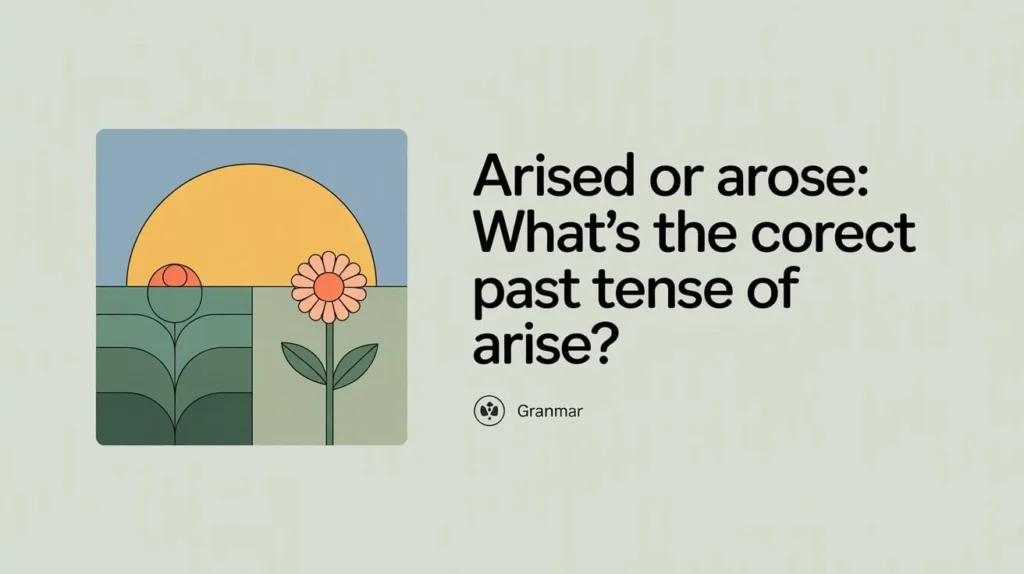Confusion around the past tense of arise is more common than you might think. Many English learners and even native speakers stumble over whether to say arised or arose. This little verb seems simple at first, but its irregular nature trips people up constantly. Using the wrong form can make your writing look sloppy or unprofessional.
In this guide, we’ll clear up all your doubts. You’ll learn the correct past tense of arise, understand why arised is incorrect, and see examples that show proper usage. We’ll also explore related forms like arisen, explain common mistakes, and give you memory tips to remember them easily. By the end, you’ll confidently know which form to use in any context, from casual conversation to formal writing.
English is tricky, and irregular verbs are often the culprits. But with clear explanations and practical examples, you’ll find mastering arise and its forms surprisingly simple. Whether you’re a student, professional, or just a curious language enthusiast, this guide is for you. Let’s dive in and settle the arised or arose debate once and for all.
The Verb Arise: Meaning and Usage
The verb arise means to come into being, to occur, or to appear. It’s slightly more formal than everyday words like happen or come up, making it popular in academic writing, professional reports, and literature.
For example:
- “A new opportunity arises every time you try something different.”
- “Problems often arise when communication breaks down.”
Arise is an irregular verb, which means its past tense and past participle don’t follow the standard -ed pattern. Unlike walk → walked or play → played, you can’t just add -ed. This is why many people mistakenly say arised.
You’ll often find arise used in these contexts:
- Professional settings: “Conflicts arose during the negotiation.”
- Academic writing: “Several issues arose during the study.”
- Literature and journalism: “Questions arose about the character’s motives.”
What’s the Correct Past Tense of Arise?

The correct past tense of arise is arose.
- ✅ Correct: A problem arose yesterday during the meeting.
- ❌ Incorrect: A problem arised yesterday during the meeting.
This happens because arise is irregular. Irregular verbs don’t follow the common -ed ending rule. Think of it like other verbs such as:
- go → went
- begin → began
- take → took
If you apply the regular -ed pattern to arise, it sounds unnatural and is grammatically incorrect.
Quick tip: When in doubt, check a reliable dictionary. Merriam-Webster and Oxford English Dictionary list arose as the only correct simple past tense form of arise.
Why “Arised” Sounds Like It Could Be Right
English learners often default to adding -ed for past tense. This makes arised tempting, because it follows a familiar pattern. However, it’s not recognized in modern standard English.
A few reasons people say arised:
- Analogy with similar verbs: People confuse arise with raise → raised.
- Influence of spelling: “Arise” ends with -ise, which feels like it should become arised.
- Spoken errors: Some hear arose and incorrectly spell it phonetically.
Even though arised might pop up in informal writing or older texts, it’s always considered wrong in contemporary grammar. Avoid it in essays, emails, or professional communication.
Full Conjugation of Arise
Here’s a handy table showing the main forms of arise:
| Tense | Form | Example Sentence |
| Base | arise | Problems often arise unexpectedly. |
| Past Simple | arose | A new issue arose during the meeting. |
| Past Participle | arisen | Many opportunities have arisen since then. |
| Present Participle | arising | Concerns are arising about the changes. |
This table makes it easy to see the correct form for each tense and avoid mistakes.
Example Sentences with Arose
Using arose in sentences helps cement the correct usage. Here are some examples across formal, casual, and professional contexts:
- “A conflict arose between the two departments over budget allocation.”
- “Questions arose after the report was published.”
- “Doubts arose in her mind about the proposed plan.”
- “Opportunities arose when the company expanded internationally.”
- “A technical issue arose during the software update.”
- “Tensions arose among the team members after the deadline was missed.”
- “Unexpected expenses arose during the renovation.”
- “Concerns arose about the accuracy of the data.”
- “A misunderstanding arose between the teacher and student.”
- “Excitement arose as the event drew closer.”
These examples show arose in context, demonstrating its versatility across situations.
Arisen vs Arose: Key Difference

Many learners also confuse arose with arisen. Here’s the difference:
- Arose → simple past tense (completed action in the past)
- “A problem arose yesterday.”
- Arisen → past participle (used with auxiliary verbs like have, has, had)
- “Several issues have arisen since the start of the project.”
Quick examples:
- Correct: “Conflicts arose during the meeting.”
- Correct: “Conflicts have arisen during the project.”
- Incorrect: “Conflicts arised during the project.”
Remember: arose is for past events, arisen is for perfect tenses.
Common Mistakes with Arise and How to Avoid Them
English learners make several mistakes with arise. Here’s how to spot and fix them:
Mistake 1: Using arised
- ❌ “A problem arised yesterday.”
- ✅ “A problem arose yesterday.”
Mistake 2: Confusing arise with rise or raise
- ❌ “The sun arised at 6 AM.”
- ✅ “The sun rose at 6 AM.”
Mistake 3: Overusing arise in casual writing
- ❌ “Issues arise all the time, so just chill.”
- ✅ “Problems sometimes come up, so stay flexible.”
Tip: Always check the verb form before writing, especially for irregular verbs.
Quick Memory Tips to Remember the Correct Form
Here are some easy ways to remember arose instead of arised:
- Mnemonic: “A rose blooms in the past” → arose = past tense.
- Group with other irregular verbs:
- Drive → drove
- Ride → rode
- Arise → arose
- Visual association: Imagine something literally “arising” like the sun, but in the past.
These tricks make it easier to recall the correct form under pressure.
Arised in Literature or Dialect? (Fact Check)
You might wonder if arised ever existed. Historically, some archaic English texts show forms like arised, but these are obsolete.
- Modern English: Only arose is accepted.
- Dialects: Some regional or old English dialects may have used arised, but it’s not standard.
Bottom line: Using arised today is always considered a grammatical error. Stick to arose in all formal writing.
FAQs About Arise, Arose, Arisen
Is arised ever correct?
- No. Modern English always uses arose as the past tense.
What’s the difference between arose and arisen?
- Arose = past simple, completed action.
- Arisen = past participle, used with auxiliary verbs like have/has/had.
Can I use arise in casual speech?
- Yes, but sometimes simpler verbs like come up or happen sound more natural.
Are there alternatives to arise?
- Yes: appear, emerge, come up, occur, develop.
Why do people confuse arise and raise?
- Because raise → raised looks like it should match arise → arised. Remember: arise is irregular.
Conclusion
To sum it up, the correct past tense of arise is arose. Arised is incorrect and should never appear in professional or academic writing.
Arise may seem tricky, but once you understand its irregular conjugation and compare it with arisen, it becomes easy to remember. Using the right form not only improves your grammar but also boosts your credibility.
Practice by writing your own sentences using arose and arisen, and soon, the correct usage will come naturally. Mastering irregular verbs like arise is a small step that makes a big difference in clarity, professionalism, and confidence in English.
By following these guidelines, checking examples, and using mnemonic tips, you can finally stop wondering about arised or arose and always choose the right form.

Emma Rose is an experienced English educator, writer, and language enthusiast dedicated to helping learners unlock the full power of the English language. At SynoEnglish, she shares practical grammar tips, clear explanations, and real-world language insights to make learning both effective and enjoyable. With a passion for words and a love for clarity, Emma’s goal is to help readers speak and write with confidence.



